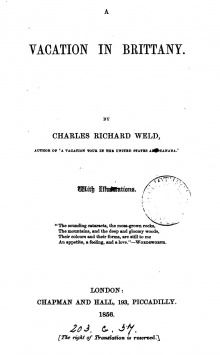WELD Charles Richard - A Vacation in Brittany
Un article de GrandTerrier.
| ||||||||||||||||||||||||||
Notice bibliographique
|
nnn Autres lectures : « BROUSMICHE Jean-François - Voyage dans le Finistère en 1829-1831 » ¤ « CAMBRY Jacques - Voyage dans le Finistère en 1794-95 » ¤ | |||||
Les pages du pardon de Kerdévot
 Pages 212 à 227 Pages 212 à 227 | |||||
Transcroption et traduction
|
Among the many strange customs which mark the Breton peasants, there is none more remarkable than that of wearing the hair ; for while the men cultivate long tresses hanging down to their waists, and of which they are very proud,* the women do not show a single lock, and the girl who might be tempted by the beauty of her chevelure to allow a ringlet to escape from beneath her closely-fitting cap, would not only lose all chance of obtaining a lover, but would be regarded by the young men as a fille perdue, that is, a coquettish girl unworthy of their affections. To this strange custom many London and Paris ladies are indebted for the magnificent hair which adorns their heads, but which was grown in the wilds of Brittany. Such were the living features which presented themselves to me; but besides these, tents, booths, and stalls displaying refreshments, principally of an intoxicating nature, were ranged in semicircular lines round the meadow, while the background of the picture was filled by the church, a large handsome structure, with a small chapel contiguous to it, and a rich Calvary representing the death and passion of our Lord. Crowds of peasants were passing in and out of the sacred edifice, attracted by the relics of St. Kerdevot, consisting of fragments of bones, which my limited knowledge of comparative anatomy did not enable me to identify as human. These relics, which were in a handsome reliquary, were exhibited by a priest to the people, who pressed eagerly forward to kiss the crystal shrine. At a convenient distance stood St. Kerdevot's money-box, into which silver and copper coins rained unceasingly, and the oblation being offered, the high priest gave absolution for past sins. Seeing these things, who could wonder that the priests lauded the miraculous power of the Saint, to whose crumbling bones such reverence was paid? Truly the Breton, believing as he does in saints innumerable, whom he is taught to believe are perpetually interceding at the gates of heaven for his admission into Paradise, must be happier than the despairing man portrayed by Coleridge,— "Sad lot, to have no hope! Though lonely kneeling,
"Jetez une joule dans le bourg; où elle s'arrêtera vous trouverez un honnête home." This is reported to have been the answer of a Breton priest to an inquiry respecting the probity of his parishioners. Did he imagine the ball would ever stop at his door? for can that man be called honest who exacts money from his poor neighbours for ecclesiastical purposes by the sale of prayers and the exhibition of rotten bones? How admirably Be ranger hits these gentry in his song, beginning — "Satan dit un jour à ses pairs,
§ Next ~ But the interior of the church ...
|
De toutes les coutumes étranges qui caractérisent les paysans bretons, il n'y en a aucune de plus notable que celle de la chevelure ; depuis longtemps les hommes ont ont l'habitude de les faire tomber dans le dos, et d'en être fier, * les femmes ne portent aucune mèche, et les filles tentées pour montrer la beauté de leur chevelure de laisser s'échapper une bouclette de leur coiffe serrée sur leur tête, perdraient du coup toutes les chances d'avoir un amoureux et seraient regardée par les jeunes gens comme une fille perdue, et donc comme une fille coquette qui ne mérite pas leurs attentions. De nombreuses femmes parisiennes ou londoniennes pratique cette coutume étrange cachant leurs magnifiques cheveux et qui provient de cette Bretagne sauvage. Such were the living features which presented themselves to me; but besides these, tents, booths, and stalls displaying refreshments, principally of an intoxicating nature, were ranged in semicircular lines round the meadow, while the background of the picture was filled by the church, a large handsome structure, with a small chapel contiguous to it, and a rich Calvary representing the death and passion of our Lord. Crowds of peasants were passing in and out of the sacred edifice, attracted by the relics of St. Kerdevot, consisting of fragments of bones, which my limited knowledge of comparative anatomy did not enable me to identify as human. These relics, which were in a handsome reliquary, were exhibited by a priest to the people, who pressed eagerly forward to kiss the crystal shrine. At a convenient distance stood St. Kerdevot's money-box, into which silver and copper coins rained unceasingly, and the oblation being offered, the high priest gave absolution for past sins. Seeing these things, who could wonder that the priests lauded the miraculous power of the Saint, to whose crumbling bones such reverence was paid? Truly the Breton, believing as he does in saints innumerable, whom he is taught to believe are perpetually interceding at the gates of heaven for his admission into Paradise, must be happier than the despairing man portrayed by Coleridge,— "Sad lot, to have no hope! Though lonely kneeling,
"Jetez une joule dans le bourg; où elle s'arrêtera vous trouverez un honnête home." This is reported to have been the answer of a Breton priest to an inquiry respecting the probity of his parishioners. Did he imagine the ball would ever stop at his door? for can that man be called honest who exacts money from his poor neighbours for ecclesiastical purposes by the sale of prayers and the exhibition of rotten bones? How admirably Be ranger hits these gentry in his song, beginning — "Satan dit un jour à ses pairs,
§ Suite ~ Mais l'intérieur de l'église ...
|
Annotations
|
Thème de l'article : Fiche bibliographique d'un livre ou article couvrant un aspect du passé d'Ergué-Gabéric Date de création : mai 2020 Dernière modification : 20.05.2020 Avancement : |



















